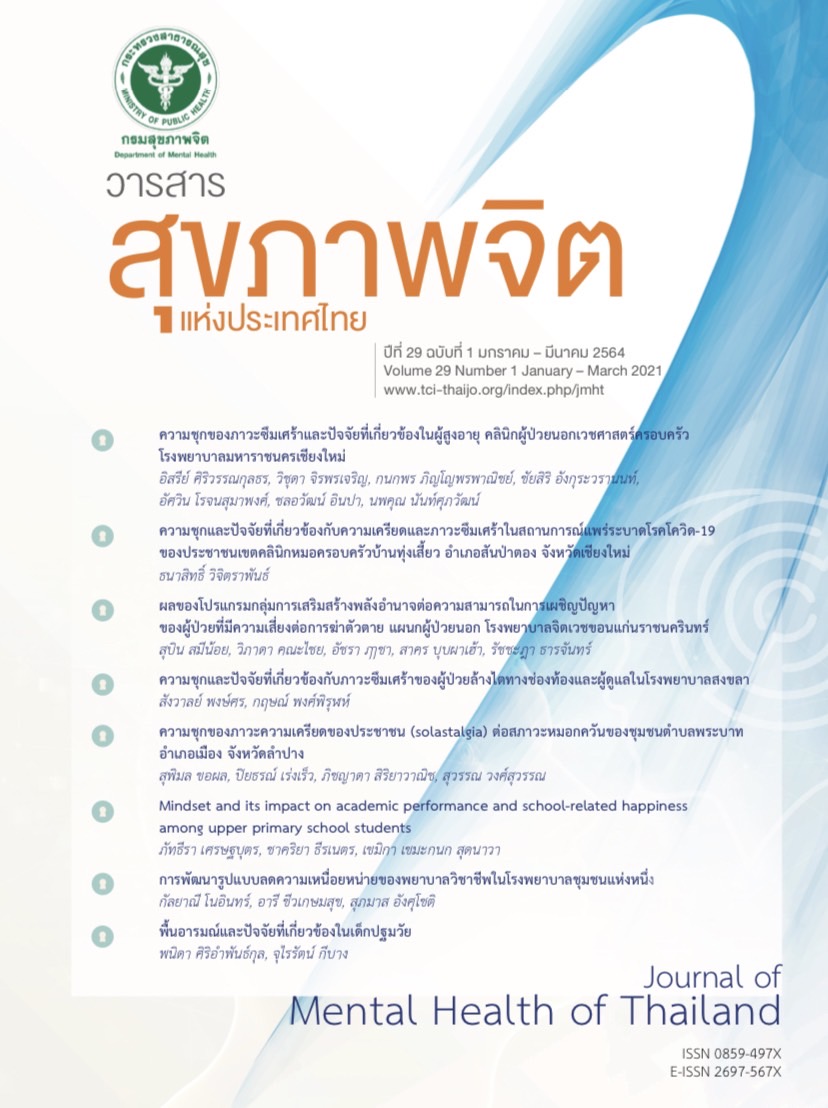ผลของโปรแกรมกลุ่มการเสริมสร้างพลังอำนาจต่อความสามารถในการเผชิญปัญหา ของผู้ป่วยที่มีความเสี่ยงต่อการฆ่าตัวตาย แผนกผู้ป่วยนอก โรงพยาบาลจิตเวชขอนแก่นราชนครินทร์
คำสำคัญ:
ความสามารถในการเผชิญปัญหา, โปรแกรมกลุ่มการเสริมสร้างพลังอำนาจ, ผู้เสี่ยงต่อการฆ่าตัวตายบทคัดย่อ
วัตถุประสงค์ : เพื่อศึกษาผลของโปรแกรมกลุ่มการเสริมสร้างพลังอำนาจแบบผู้ป่วยนอกต่อความสามารถในการเผชิญปัญหาของผู้ที่มีความเสี่ยงต่อการฆ่าตัวตาย
วิธีการ : เป็นการวิจัยกึ่งทดลองแบบวัดซ้ำ กลุ่มตัวอย่าง ได้แก่ ผู้ป่วยนอกโรงพยาบาลจิตเวชที่มีความเสี่ยงต่อการฆ่าตัวตายและมีคุณสมบัติตามเกณฑ์กำหนดจำนวน 20 คน จับสลากเข้ากลุ่มทดลองและกลุ่มควบคุมกลุ่มละ 10 คน กลุ่มทดลองได้รับโปรแกรมกลุ่มการเสริมสร้างพลังอำนาจแบบผู้ป่วยนอก และกลุ่มควบคุมได้รับบริการบำบัดทางจิตสังคมตามปกติ ประเมินผลลัพธ์ด้วยแบบประเมินความสามารถในการเผชิญปัญหาก่อนและหลังเข้าร่วมโปรแกรม และหลังติดตามหนึ่งเดือน วิเคราะห์ข้อมูลด้วยสถิติเชิงพรรณนา วิเคราะห์ความแปรปรวนร่วม และวิเคราะห์ความแปรปรวนทางเดียวแบบวัดซ้ำ
ผล : กลุ่มที่ได้รับโปรแกรมกลุ่มการเสริมสร้างพลังอำนาจ มีคะแนนเฉลี่ยความสามารถในการเผชิญปัญหาสูงกว่าก่อนทดลอง (1 = 91.6, SD=12.14,
2 = 107, SD = 11.8,
3 = 106.6, SD = 11.13) และสูงกว่ากลุ่มที่ได้รับการบำบัดทางจิตสังคมตามปกติอย่างมีนัยสำคัญทางสถิติ (
experimental = 106.6, SD = 11.13,
control = 99.5, SD = 15.29) เมื่อติดตาม 1 เดือน กลุ่มที่ได้รับโปรแกรมกลุ่มการเสริมสร้างพลังอำนาจมีคะแนนเฉลี่ยความสามารถในการเผชิญปัญหาลดลงน้อยกว่ากลุ่มที่ได้รับการบำบัดทางจิตสังคมตามปกติ (0.4 และ 5.9 ตามลำดับ)
สรุป : กลุ่มการเสริมสร้างพลังอำนาจสามารถเพิ่มความสามารถในการเผชิญปัญหาในผู้ที่เสี่ยงต่อการฆ่าตัวตาย อาจพิจารณาให้เป็นกลุ่มบำบัดทางเลือกในระบบการดูแลช่วยเหลือผู้ที่เสี่ยงต่อการฆ่าตัวตายแบบผู้ป่วยนอกได้
Downloads
เอกสารอ้างอิง
World Health Organization. Mental health: suicide data [internet]. Geneva: World Health Organization; [cited 2018 May 18]. Available from: https://www.who.int/mental_health/prevention/suicide/suicideprevent/en/.
กรมสุขภาพจิต. รายงานจำนวนการฆ่าตัวตายของประเทศไทย 2560 [GIS Report 2560] [อินเทอร์เน็ต]. นนทบุรี: กรม; 2562 [สืบค้นเมื่อวันที่ 13 ธ.ค. 2561]. จาก: https://dmh.go.th/report/map/.
สุพัตรา สุขาวห, สุวรรณา อรุณพงค์ไพศาล. ปัจจัยเสี่ยงและทฤษฎีที่เกี่ยวข้องกับการฆ่าตัวตายในวัยรุ่น: การทบทวนวรรณกรรมเชิงลึก [Risk Factor and Suicide Theory Associated with Suicide in Adolescents: A Narrative Reviews]. วารสารสมาคมจิตแพทย์แห่งประเทศไทย. 2560:62;359-78.
โรงพยาบาลจิตเวชขอนแก่นราชนครินทร์. รายงานประจำปี 2561 โรงพยาบาลจิตเวชขอนแก่นราชนครินทร์ [Annual report 2018, Khon Kaen Rajanagarindra psychiatric hospital]. ขอนแก่น: โรงพยาบาล; 2561.
Lindsay A. Bornheimer, Anao Zhang, Juliann Li, Matthew Hiller, Nicholas Tarrier. Effectiveness of Suicide-Focused Psychosocial Interventions in Psychosis: A Systematic Review and Meta-Analysis. Psychiatric Services. 2020;7:829-38. doi:10.1176/appi.ps.201900487.
วราภรณ์ ประทีปธีรานันต์. ผลของโปรแกรมการเสริมสร้างพลังอํานาจต่อความสามารถในการเผชิญปัญหาของผู้พยายามฆ่าตัวตาย [The effect of empowerment program on coping ability of suicidal attempters] [วิทยานิพนธ์ปริญญามหาบัณฑิต]. กรุงเทพฯ: คณะพยาบาลศาสตร์ จุฬาลงกรณ์มหาวิทยาลัย; 2556.
Englert C, Bertrams A, Dickhauser O. Dispositional self-control capacity and trait anxiety as relates to coping styles. Psychology. 2011;2:598-604. doi:10.4236/psych.2011.26092.
Gibson CH. The process of empowerment in mothers of chronically ill children. J Adv Nurs. 1995;21:1201-10. doi:10.1046/j.1365-2648.1995.21061201.x.
Corey G. Theory and practice of group counseling. 8th ed. Australia: Thomson & Brooks/Cole; 2010.
นิพิฐพนธ์ สนิทเหลือ, วัชรีพร สาตร์เพ็ชร์, ญาดา นภาอารักษ์. การคำนวณขนาดตัวอย่างด้วยโปรแกรมสำเร็จรูป G*POWER [Sample size calculation using G*POWER Program]. วารสารวิชาการ สถาบันเทคโนโลยีแห่งสุวรรณภูมิ. 2019:5:496-507.
ปราโมทย์ เชาว์ศิลป์, รณชัย คงสกนธ์. กลุ่มจิตบำบัดสำหรับคนไข้ใน [Inpatient group psychotherapy]. กรุงเทพฯ: สหประชาพาณิชย์; 2542.
Seaborg M. A Manual of counsellors: group therapy for post-crisis suicidal adolescent clients. Alberta CA: Athabasca University; 2011.
Jalowiec A, Murphy SP, Powers MJ. Psychometric assessment of the Jalowiec coping scale. Nurs Res. 1984;33:157-61. PMID:6563533.
Akey TM, Marquis JO, Ross ME. Validation of scores on the psychological empowerment scale: a measure of empowerment for parents of children with a disability. Educational & Psychological Measurement. 2000;60:419-38. doi:10.1177/00131640021970637.
Galanakis M, Tsoli S, Darviri C. The effects of patient empowerment scale in chronic diseases. Psychology. 2016;7:1369-90. doi:10.4236/psych.2016.711138.
Gutierrez, Lorraine M. Beyond Coping: An Empowerment Perspective on Stressful Life Events. The Journal of Sociology & Social Welfare. 1994;21(3):201-19. Available from: https://scholarworks.wmich.edu/jssw/vol21/iss3/13
Woodall J, Raine G, South J, Warwick-Booth L. Empowerment & health and well-being: evidence review [Project Report]. UK: Centre for Health Promotion Research, Leeds Metropolitan University; 2010.
Marmarosh CL, Tasca GA. Adult attachment anxiety: using group therapy to promote change. J Clin Psychol. 2013;69:1172-82. doi:10.1002/jclp.22044.
Williams B. Group therapy: a natural opportunity for support. Practice Nursing. 2014;25:190-4. doi:10.12968/pnur.2014.25.4.190.
กรรณิการ์ ผ่องโต. ผลของโปรแกรมการเสริมสร้างความเข้มแข็งทางใจต่อความคิดฆ่าตัวตายในผู้ที่พยายามฆ่าตัวตาย [The effect of the resilience enhancement programe on suicidal ideation in suicidal attempter] [วิทยานิพนธ์ปริญญามหาบัณฑิต]. กรุงเทพฯ: คณะพยาบาลศาสตร์ จุฬาลงกรณ์มหาวิทยาลัย; 2557.
Choi NG, Marti CN, Conwell Y. Effect of problem-solving therapy on depressed low-income homebound old adults’ death/suicidal ideation and hopelessness. Suicide Life Threat Behav. 2016;46:323-36. doi:10.1111/sltb.12195.
ธวัชชัย พละศักดิ์, รังสิมันต์ สุนทรไชยา, รัชนีกร อุปเสน. ผลของโปรแกรมการบำบัดโดยการแก้ปัญหาต่อภาวะซึมเศร้าในผู้ป่วยโรคซึมเศร้า [The effect of the problem solving therapy program on depression of patients with major depressive disorder]. วารสารพยาบาลจิตเวชและสุขภาพจิต. 2560;31:60-74.
สุวดี ศรีวิเศษ, วัชนี หัตถพนม, สายชล ยุบลพันธ์, สโรชา บางแสง, อิงคฏา โคตนารา. กลุ่มบำบัดโดยการแก้ปัญหา ในผู้ป่วยที่มีภาวะซึมเศร้าและเสี่ยงต่อการฆ่าตัวตาย [Problem solving therapy group in patients with depressive symptoms and suicidal risk]. วารสารสุขภาพจิตแห่งประเทศไทย. 2556;21(2):98-109.
Sockalingamm S, Flett H, Bergmans Y. A pilot study in suicide intervention
training using a group intervention for patients with recurrent suicide attempts. Acad Psychiatry. 2010;34:132-5. doi:10.1176/appi.ap.34.2.132.
Crespi TD. Group counselling in the schools: Legal, ethicial, and treatment issues in school practice. Psychology in the schools. 2009;46:273-80. doi:10.1002/pits.20373.
Yalom ID, Moly L. The theory and practice of group psychotherapy. 5th ed. New York: Basic Books, Inc.; 2005.
Spears AP, Sullivan SR, Goodman M, Peters J. The efficacy of groups in preventing suicide: Is contagion a concern of the past?. Int Clin Med. 2019;3:1-2. doi:10.15761/ICM.1000153.
Lazarus RS, Folkman S. Stress, appraisal and coping. New York: Springer; 1984.
ดาวน์โหลด
เผยแพร่แล้ว
รูปแบบการอ้างอิง
ฉบับ
ประเภทบทความ
สัญญาอนุญาต
- ผู้อ่านสามารถนำข้อความ ข้อมูล จากวารสารไปใช้ไปใช้ประโยชน์ทางวิชาการได้ เช่น เพื่อการสอน เพื่อการอ้างอิง แต่การนำไปใช้เพื่อวัตถุประสงค์อื่น เช่น เพื่อการค้า จะต้องได้รับอนุญาตเป็นลายลักษณ์อักษรจากกรมสุขภาพจิตก่อน
- ความคิดเห็น ข้อมูล และบทสรุปต่าง ๆ ที่ลงตีพิมพ์ในวารสารสุขภาพจิตแห่งประเทศไทยเป็นของผู้เขียนบทความและมิได้แสดงว่ากองบรรณาธิการหรือกรมสุขภาพจิตเห็นพ้องด้วย




